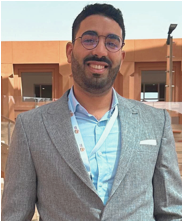ADD THESE DATES TO YOUR E-DIARY OR GOOGLE CALENDAR
This site is part of the Siconnects Division of Sciinov Group
This site is operated by a business or businesses owned by Sciinov Group and all copyright resides with them.
ADD THESE DATES TO YOUR E-DIARY OR GOOGLE CALENDAR

Mohammed VI Polytechnic University
Title:From natural to agricultural ecosystems: Harnessing soil microbiota for disease suppression, litter decomposition, and plant growth enhancement
Soil microbiota are central to ecosystem resilience, with critical roles in disease suppression, litter decomposition, and plant growth. Transitioning from natural to agricultural ecosystems, however, often disrupts microbial diversity and functionality due to intensified land use, altering these beneficial processes. This work explores how microbial communities shift across ecosystem types, examining the resulting impacts on soil health and productivity. Studies in diverse ecosystems including forests, grasslands, and high-intensity agricultural soils reveal that natural systems typically support higher microbial diversity and unique fungal communities, while agricultural soils, especially under greenhouse conditions, exhibit lower diversity and higher pathogen presence (e.g., Alternaria, Fusarium). Forests, rich in organic matter and nitrogen, are particularly conducive to microbial functions that support plant health and soil structure, while the intensification in agricultural settings often depletes these resources. Further, microbial contributions to disease suppression vary with soil treatment; organic amendments like biochar and manure enhance suppressiveness against pathogens such as Fusarium and Sclerotinia, although conventional fertilizers may still be needed for specific pathogens like Rhizoctonia. Additionally, microbial communities can mitigate or exacerbate the allelopathic effects of decomposing leaf litter on plants, crucial for nutrient cycling and plant regeneration. Understanding and harnessing these microbial dynamics offers new potential for sustainable agriculture, using soil microbiota to reduce reliance on chemical inputs and support plant health naturally. This approach underscores the need for microbiome-conscious management that balances productivity with ecosystem integrity across land-use gradients.
Mohamed Idbella completed his PhD at the age of 29 from Federico II University of Naples, Italy, followed by postdoctoral studies at the same university and the University of Florida. He is currently an Assistant Professor in Soil Microbial Ecology at Mohammed VI Polytechnic University, Morocco. Dr. Idbella has authored over 50 papers in high-impact journals and serves on the editorial boards of prominent journals, including Soil Biology and Biochemistry, Bioresource Technology, Applied Soil Ecology, Communications Biology, and Plant and Soil. His research focuses on soil microbiota roles in plant growth, disease suppression, and nutrient cycling within diverse ecosystems.